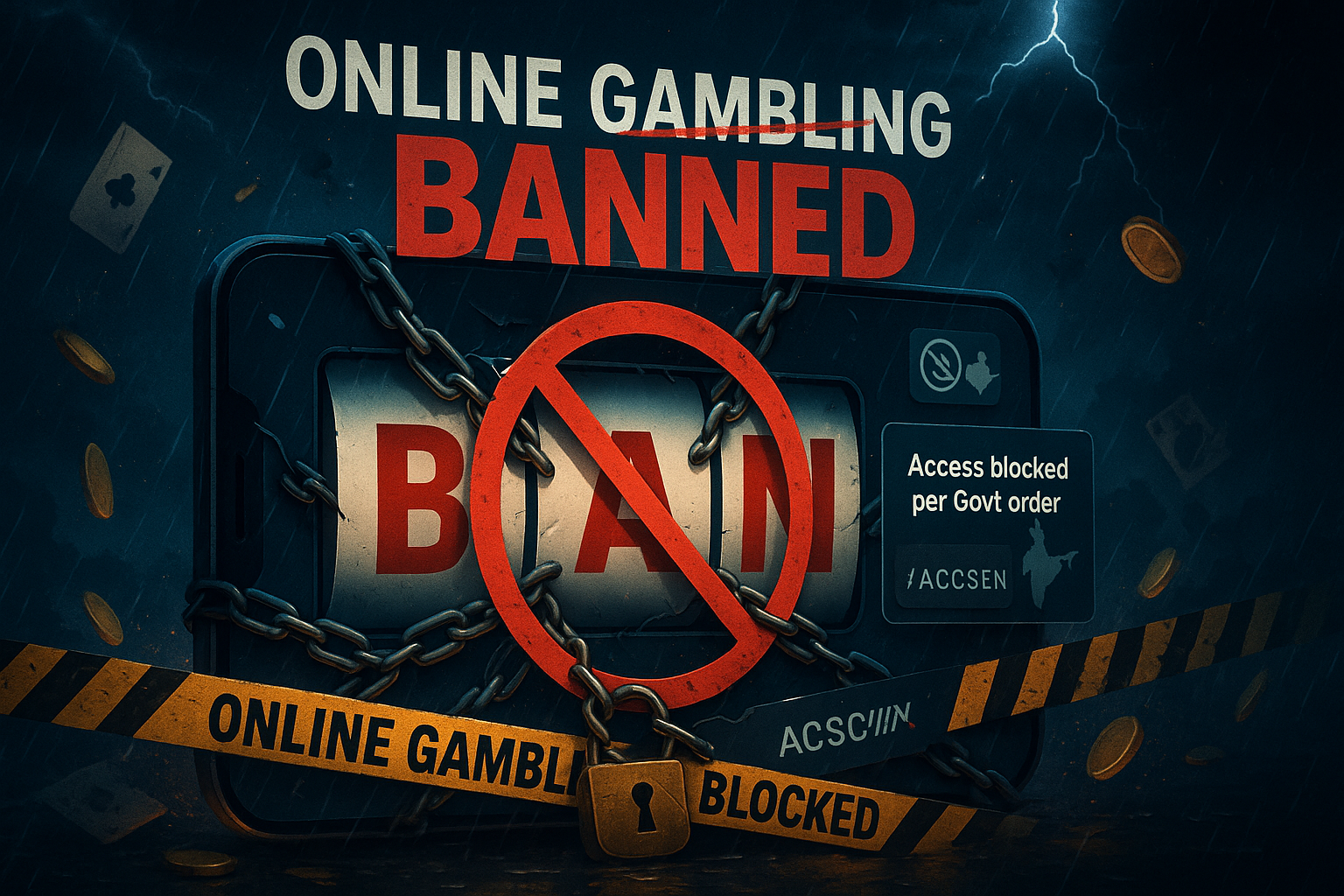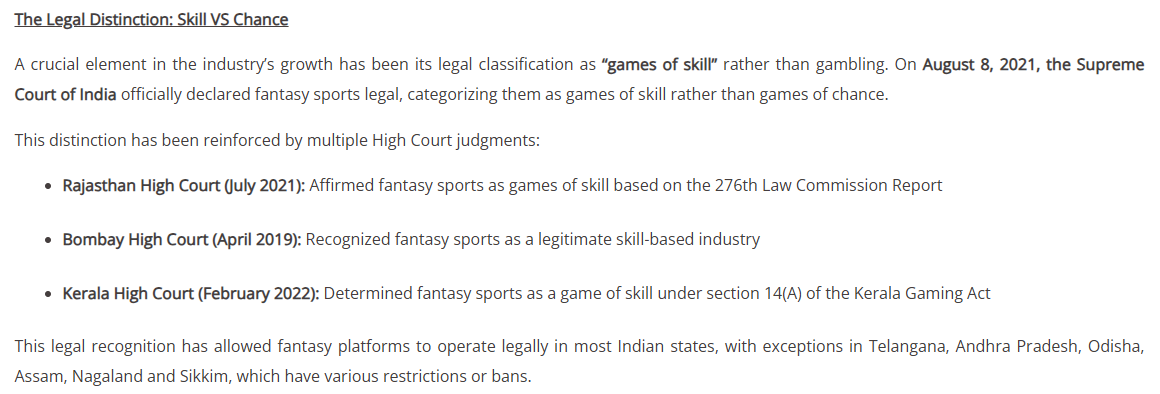
Welcome to this week’s edition of TOPICAL WEDNESDAY. This week, we look at a recent regulatory decision that brought India’s real-money gaming sector to an abrupt halt.
If you missed our earlier edition on the rise of fantasy sports in India, where we unpacked the skill vs luck debate and how platforms makes money, you can read it here.
In August 2025, the government passed the Online Gaming Act, banning all online games involving real-money transactions.
In just couple of days, most leading platforms went dark. For millions of users, this means no more fantasy cricket during IPL season, no more rummy or poker with stakes, even if it’s between friends. A once-booming digital sector was unplugged almost overnight.
This edition explores the intent behind the new law, the immediate fallout, how companies and investors are reacting, and what might lie ahead.
What Happened?
On August 22, 2025, the government passed the Online Gaming Act, banning all real-money online games, regardless of whether they are based on skill or chance. Put simply: if money is involved, whether as entry fee, prize, or bet, it’s now outside the law.
The law prohibits:
- Real-money gaming platforms (e.g., fantasy sports, rummy, poker)
- Advertising and influencer promotions
- Payment processing for such games
Violations can attract fines up to ₹1 Cr and jail time. Enforcement is backed by Section 69A of the IT Act (which allows website/app blocking), and a new regulator has been set up: the National Online Gaming Commission (NOGC).
The biggest shift? The Act removes the long-standing legal distinction between “games of skill” and “games of chance,” which had previously been central to the industry’s operations.
For years, Indian courts had ruled that games like fantasy sports and rummy fell under the category of skill-based activities, shielding them from anti-gambling laws. This distinction had allowed platforms to operate within a grey area, not fully regulated, yet not illegal. The new Act discards that legal nuance entirely, choosing instead to apply a blanket ban on any game involving monetary stakes, regardless of the degree of skill involved.

(Source: Bastion Research)
So What Changed?
While this law is a dramatic shift, it has been building up over time. The government’s discomfort with real-money gaming isn’t new. In 2023, it imposed a steep 28% GST on the full value of online gaming transactions, not just platform fees. That move alone made India one of the costliest markets in the world for this sector. Add to that a history of state-level bans, public interest litigations, and media scrutiny around gaming-related addictions and financial distress, and the writing was on the wall.
The Online Gaming Act, in many ways, codifies this long-standing unease into law. It formalises disapproval that previously showed up only as tax moves or regional restrictions.
At the same time, the law draws a clear line: E-sports, defined as competitive, non-wagering digital gaming, is explicitly excluded from the ban. In fact, the government has signalled support for esports as a growth sector. This carve-out is important: it suggests a future where digital gaming, if structured around skill, spectatorship, and non-monetised participation, could still thrive with clearer guardrails.
Immediate Impact
The move is also likely to result in a significant shortfall in tax collections. The real-money gaming sector had emerged as a growing source of indirect tax revenue in recent years. With the 28% GST now rendered irrelevant by the shutdown of platforms, the government stands to lose an estimated ₹15,000–20,000 crore in annual tax revenue, a figure that had been steadily rising with user engagement and transaction volumes.
Further, platforms didn’t wait to see how the law would be implemented. Most responded immediately:
- Dream11 paused all paid contests and halted its high-profile sponsorship with the BCCI. It also publicly stated that there would be no layoffs and that the company would shift its focus toward strengthening non-gaming verticals such as sports content, esports, and financial products (FanCode, Dream Game Studios etc.).
- MPL suspended all real-money formats, while retaining its casual gaming and esports portfolio. It may lean on its overseas presence and earlier pivots to diversify revenue.
- WinZO suspended real-money formats and has since launched a new content platform in the U.S. market.
- Zupee shut down real-money games but continues to offer free-to-play formats to its 150 million user base.
- Junglee, owned by Flutter, shut down real-money gaming operations in India entirely, despite being a ₹1,600+ Cr revenue contributor.
- Payment gateways and ad-tech partners began reassessing relationships and compliance frameworks with these platforms.
Stock markets reacted too. Shares of listed gaming-related firms like Nazara Tech saw a dip. Venture capital investors started reviewing exposure to the space, and several paused new funding discussions.

(Source : IndianRetailer.com)
While the financial and operational impact was immediate, the government has maintained that the ban is aimed at protecting users. Officials have cited concerns over rising addiction, misuse of personal finances, and exposure to misleading ads and influencer-driven promotions.
Over time, the government’s concerns have expanded: from tax evasion and aggressive advertising to more alarming outcomes such as suicides, mounting user debt, loan defaults, and even alleged links to criminal misuse and terror financing.
The Ministry of Electronics and IT has also pointed to the need for consumer safeguards, noting that current models made it easy for underage or vulnerable users to access real-money formats without friction.
The Centre appears to have concluded that piecemeal regulations were no longer enough, and a more sweeping measure was necessary.
In that context, the law is positioned not just as enforcement, but as a signal to rebuild the sector, if at all, around stronger accountability, age-gating, and financial transparency.
The People Side of the Story
The real-money gaming industry wasn’t just digital entertainment, it supported an ecosystem of over 2 lakh people, including developers, designers, data analysts, operations staff, marketing teams, and esports professionals.
With the law taking effect almost immediately, startups scrambled to offer severance packages and transition support. Some began helping employees relocate to overseas roles, especially in markets where gaming remains legal and regulated.
Meanwhile, users, particularly regular gamers are migrating to grey-market or offshore apps, raising fresh concerns about data security, fraud, and regulatory circumvention. Experts warn that such platforms may operate without local legal accountability, potentially exposing users to greater financial risk.
Concerns Around the Law
Not everyone is on board with the new legislation. Critics argue that the blanket nature of the ban ignores previous Supreme Court rulings that upheld the legality of skill-based gaming. Legal experts say:
- The Act overrides existing jurisprudence and could set a worrying precedent
- It eliminates legitimate, tax-paying businesses overnight
- It could shift real-money gaming underground, where regulation is harder
Even state governments are divided. Karnataka’s IT minister publicly criticised the move as a “masterstroke in bad policymaking.”
Some companies are preparing legal challenges. Their contention: instead of building robust regulation (e.g., licensing, deposit caps, age-gating), the government chose a total ban, which may not hold up in higher courts.
How Other Countries Handle This
India’s move is one of the strictest globally.
- UK: Allows regulated betting and online gaming under strict licensing
- Singapore: Permits social gaming and operates a regulatory authority to supervise online games
- China: Regulates usage time and access, especially for minors, but does not ban real-money gaming altogether
In many of these countries, a balance is struck between user protection and business viability. In contrast, India’s new law leaves no room for legal operation even for games once deemed legal.
What Happens Next?
Several paths could emerge from here:
- Judicial Review: Legal challenges might lead courts to seek clarification or moderation of the law, possibly reviving the skill vs chance distinction, or asking for regulatory guidelines instead of a ban.
- Policy Recalibration: The government could revise its stance, introducing a licensing regime like in other countries. This could include age checks, deposit caps, and transparency norms.
- Status Quo: The ban could remain in force, leading to more startups shutting shop or pivoting abroad. User activity might shift to grey zones including VPN-based access to foreign apps, further complicating regulatory oversight.
Some Indian platforms might eye overseas markets like the UAE, Africa, or Southeast Asia for future growth. These regions have their own gaming regulations, but many remain more open than India’s post-ban framework.
Closing thoughts
The gaming ban is a regulatory inflection point for India’s digital economy. It marks a clear assertion of the government’s discomfort with business models that blur the lines between entertainment and wagering. While positioned as a user protection measure, it also signals that certain types of monetisation, even if technically legal, may not find long-term regulatory support. This has implications not just for gaming, but for other grey-zone consumer-tech models as well.
For companies, it’s a reminder that business models built on regulatory ambiguity may not be sustainable in the long term. For investors, it raises tough questions about risk assessment in policy-sensitive sectors. And for policymakers, it reflects the challenge of safeguarding users while nurturing entrepreneurship.
What happens next, through the courts, industry lobbying, or policy review. will determine whether India builds a more mature, well-regulated gaming ecosystem or simply pushes activity offshore. Either way, the decisions made in the coming months will shape the digital economy’s direction for years to come.
We’d also love to hear your thoughts and feedback on X. Connect with us there at @bastionresearch.
Happy Investing!!!
Disclaimer: This newsletter is for educational purposes only and is not intended to provide any kind of investment advice. Please conduct your own research and consult your financial advisor before making any investment decisions based on the information shared in this newsletter.
😂Meme of the Week🤣

Follow us
If you are a diligent investor, you would not want to miss checking out our research platform, where we share insightful research on companies regularly. Gain access to our sample research by clicking on the button below.




